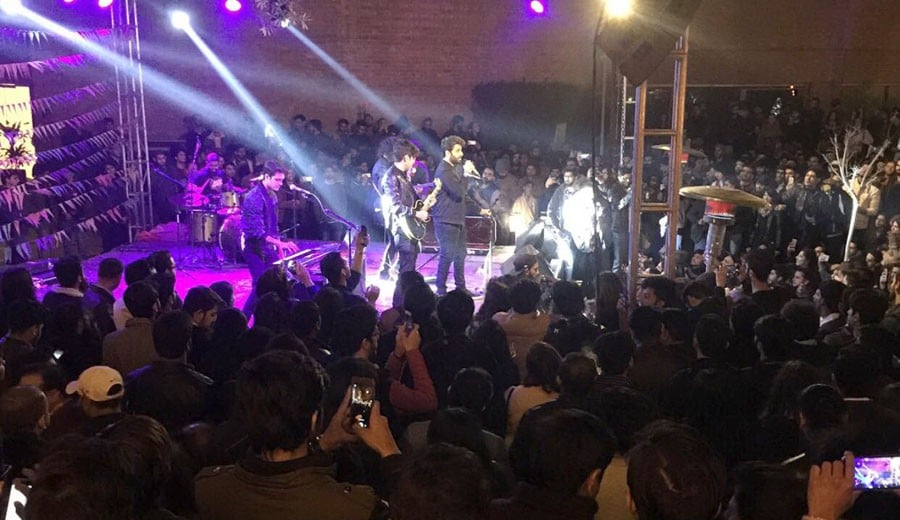
The Lahore Music Meet 2018 was a success, but it could do with a couple more big names even as it stays focused on its indie stars

Let me state from the onset that the Lahore Music Meet (LMM) is a good idea, well executed. It draws a young, well-heeled crowd to a public arena like the Mall Road Alhamra and gives them music they can relate to. It brings together ‘indie’ food, merchandise, and music under one umbrella, and it does it well. It knows its audience -- teenagers and twenty-somethings looking to partake in the local scene populated by bands that have many of their friends playing in them.
As such the LMM is as much a festival aimed at an in-group as is the Lahore Literary Festival (LLF), the latter at the old, established elite of the country, the former at their young offspring. However, the fact that they are free, and held at Alhamra, The Mall, a place that also hosts Punjabi theatre and other forms of indigenous art, means these festivals are technically open to a range of attendees. The display of cars and western attire, as well as inaccessibility to the media on which these festivals are advertised can, however, limit audiences to those ‘in the know’.
That is how it was for nearly two days at the LMM where indie bands ruled the ‘Showcase’ open-air arena. Most people who were there to see and be seen converged around this makeshift stage in the lawn, the heart of the festival’s activity. As I entered the grounds on Saturday at around 2, folk singer Fazal Jutt, an unexpected choice for the event, was singing ‘Jagga’, the strains of his song about a bandit from Kasur wafting above the chatter of the cool, yuppie crowd spread out over the Alhamra lawns. Bands more in tune with the audience’s sensibilities started taking centre stage later in the day, but didn’t necessarily create much of an impact. Wisdom Salad and Roots put up an amateurish performance, their sound not managing to come together as a coherent whole, but they are new and hopefully exposure to live audiences of this kind will help them become more polished. It was around dusk that Mauj, a considerably older band managed to pull together the first truly professional performance of the day, stirring the audience to sing along to the infectious hook ‘Ranjha teray bin, tarpa raat aur din’ from their hit song ‘Paheliyan’.
The headlining acts for day one performing in Hall 1 were Sikandar Ka Mandar and folk singer Akhtar Channal. Sikandar Ka Mandar seems to be the ‘it’ band of the young indie Pakistani rock crowd and Hall 1 was nearly full for their performance. For those of us who have seen big bands like EP fill up the Kinnaird amphitheatre under strobe lights and smoke machines, headbanging in unison to ‘Hamesha’, Sikandar Ka Mandar’s flat stage performance didn’t really offer much. They weren’t helped by the fact that the stage was too big for the four of them, lights flooded the stage without any attempt at lighting effects and the band members’ personalities seemed a tad tame for rock stars. They might come off better on a smaller, more intimate stage, where their alt-rock sound would carry better.
Being a music festival, LMM lends itself well to live performances, unlike a literary festival whose audiences might be better off reading a book in depth than listening to short sound bites on stage. That’s why the idea of talks at the LMM seems mostly redundant, unless these talks are well thought-out and planned in advance. Unfortunately, this was not the case at this year’s festival. The ‘masterclasses’ held inside various halls came across as haphazard and perfunctory. The one I attended, Shehzad Noor’s ‘How to Write a Song’ had some interesting insights for young participants, particularly on how not to give up on oneself and the pain an artist has to endure through the creative process, but suffered from the speaker’s opening declarations that he wasn’t quite prepared for the talk and that it wasn’t about ‘how to write a song’.
Self-deprecation has its place in life, but that place is rarely on a stage where the talk is titled ‘how to’, in which case audiences are looking for someone to take charge. These kinds of minor issues could have been ironed out, I felt, if the organizers had discussed the talks with speakers beforehand. Then there was the fact that some of the lined-up speakers (like Fasi Zaka and Zeeshan Parvez) didn’t show up, leaving fans disappointed. Irresponsible, I say, of those who promise then don’t deliver.
Bayaan livened up the second day at the ‘Showcase’ with a mature performance, followed by the biggest commercial draw of the festival, the Pepsi Battle of the Bands winner, Kashmir. Large groups of people poured in for Kashmir’s performance, changing the makeup of the event for that one hour, showcasing the power of television, still the greatest medium for turning musicians into celebrities. Kashmir did not disappoint, ending with an encore of their original hit song ‘Kaaghaz ka Jahaaz’, leaving a satiated audience, hopeful for the future of Pakistani music.